Page revised 21 August
2001
EDWARD LAW
HUDDERSFIELD &
DISTRICT HISTORY
THE
LOYAL UNITED FREE MECHANICS.
Edward J Law.
On 26 April 1851 the Prince of
Wales Friendly Society Lodge No. 85 was formed with headquarters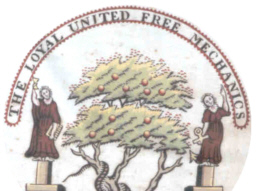 at the Sportsman’s Arms, Westleigh
Mill, Leigh, Lancashire. By 1862 when they registered their rules
they had adopted a new name, the Loyal United Free Mechanics. As
lodge number 85 they must have been part of some sort of
affiliated order; whether this was the case after the change of
name is not apparent. In 1872 there was in Lancashire an Order of
Mechanics which had a membership of over 3,500 in 71 lodges,
whether this was the successor to the Prince of Wales Friendly
Society, or whether the Loyal United Free Mechanics were a part
of the order is not known.
at the Sportsman’s Arms, Westleigh
Mill, Leigh, Lancashire. By 1862 when they registered their rules
they had adopted a new name, the Loyal United Free Mechanics. As
lodge number 85 they must have been part of some sort of
affiliated order; whether this was the case after the change of
name is not apparent. In 1872 there was in Lancashire an Order of
Mechanics which had a membership of over 3,500 in 71 lodges,
whether this was the successor to the Prince of Wales Friendly
Society, or whether the Loyal United Free Mechanics were a part
of the order is not known.
The rules show that the principle
objectives of the Society were to give financial relief to
members in sickness or at death. Combinations of workers to
establish funds for the relief of the sick had been taking place
since the end of the seventeenth century, and had spread greatly
in the eighteenth century leading in 1793 to the passing of the
Friendly Societies Act, which gave them official recognition and
protection of their funds. By the Victorian era sick or burial
clubs of one form or another were commonplace. With the welfare
state undreamt of, working men paid a few pence a week to secure
benefits at times of need: some of these bodies survive to the
present time, notably the Oddfellows and the Buffaloes.
At Lodge 85 members had to pay an
entry fee ranging from 5s. 6d. at age 18 to £1 12s. 0d. at age
40. As in most similar societies new members over the age of 40
were not accepted on the basis that members over that age were
more likely to be in benefit and would use up the funds which
members 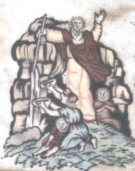 had contributed in their earlier, healthier,
working life. Once admitted members were to pay 1s. 3d. every
four weeks plus 1d. a month to cover the necessary costs of
management. The management costs would consist principally of
rent of the meeting room, in addition it may well have included
provision of ale on meeting nights. Whilst hardly a necessity of
management, such conviviality was generally as much a feature of
such clubs as was the provision of benefits. It is significant
that the very first rule of the Society stated that the business
of the Society was to be carried on at the Sportsman’s Arms.
No mention of provision of ale or spirits could be included in
the rules or the Registrar of Friendly Societies would have
refused to register them: nor could any such outlay be shown in
the accounts of societies. To circumvent the the problem the
illicit payments were generally classed as rent! There was no
provision in the rules for any of the officers of the Society to
receive payment for their services; on the contrary there were
fines to be imposed on any who refused or neglected an office.
had contributed in their earlier, healthier,
working life. Once admitted members were to pay 1s. 3d. every
four weeks plus 1d. a month to cover the necessary costs of
management. The management costs would consist principally of
rent of the meeting room, in addition it may well have included
provision of ale on meeting nights. Whilst hardly a necessity of
management, such conviviality was generally as much a feature of
such clubs as was the provision of benefits. It is significant
that the very first rule of the Society stated that the business
of the Society was to be carried on at the Sportsman’s Arms.
No mention of provision of ale or spirits could be included in
the rules or the Registrar of Friendly Societies would have
refused to register them: nor could any such outlay be shown in
the accounts of societies. To circumvent the the problem the
illicit payments were generally classed as rent! There was no
provision in the rules for any of the officers of the Society to
receive payment for their services; on the contrary there were
fines to be imposed on any who refused or neglected an office.
The benefits were a
sick allowance of 8s. 0d. per week for the first 26 weeks of any
illness and then at the reduced rate of 4s. od. Per week. The
funeral allowance was £8 for a member, being paid to a 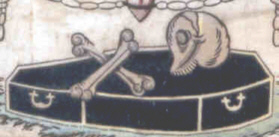 relative of his prior nomination; £6 for a
member’s first wife; £3 for his second wife; and £1 at the
death of a child under twelve years of age. The rules contain no
reference to a minimum age for entry: the provision of burial
benefit only up to the age of twelve would seem to indicate that
they would be eligible for entry at that age, when many would be
working. The fact that there was no provision for an entrance fee
under the age of eighteen is possibly based on an actuarial view
of the risks involved, as indeed was the graduated scale of entry
fees above that age. The level of funeral benefit was generous;
some societies allowed only £2, and in 1849 a funeral could be
conducted for as little as £2 3s. 6d.
relative of his prior nomination; £6 for a
member’s first wife; £3 for his second wife; and £1 at the
death of a child under twelve years of age. The rules contain no
reference to a minimum age for entry: the provision of burial
benefit only up to the age of twelve would seem to indicate that
they would be eligible for entry at that age, when many would be
working. The fact that there was no provision for an entrance fee
under the age of eighteen is possibly based on an actuarial view
of the risks involved, as indeed was the graduated scale of entry
fees above that age. The level of funeral benefit was generous;
some societies allowed only £2, and in 1849 a funeral could be
conducted for as little as £2 3s. 6d.
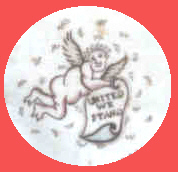 Whilst on the face of it the Loyal United
Free Mechanics was a friendly society, there are indications that
it may have been something more. The adoption of the new ‘working
class’ name in place of the patriotic Prince of Wales Lodge
gives rises to questions. Whilst the title Loyal United Free
Whilst on the face of it the Loyal United
Free Mechanics was a friendly society, there are indications that
it may have been something more. The adoption of the new ‘working
class’ name in place of the patriotic Prince of Wales Lodge
gives rises to questions. Whilst the title Loyal United Free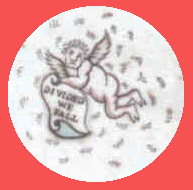 Mechanics has little meaning at the present
time, similar names had been borne by the fledgling trade unions
of the 1820s. In Bradford in 1822 when the Combination Acts which
proscribed trade unions were still in force, a Mechanics &
Friendly Union Institution was formed and at Manchester in 1826,
shortly after the repeal of those Acts, the Friendly Union of
Mechanics was founded. The latter which bore possibly the
proudest name among trade unions ‘the Old Mechanics’,
was the core around which the Amalgamted Engineering Union grew.
Mechanics has little meaning at the present
time, similar names had been borne by the fledgling trade unions
of the 1820s. In Bradford in 1822 when the Combination Acts which
proscribed trade unions were still in force, a Mechanics &
Friendly Union Institution was formed and at Manchester in 1826,
shortly after the repeal of those Acts, the Friendly Union of
Mechanics was founded. The latter which bore possibly the
proudest name among trade unions ‘the Old Mechanics’,
was the core around which the Amalgamted Engineering Union grew.
The author has an apron of the
Loyal United Free Mechanics (and another is in the National
Museum of Labour History in Manchester) which is full of
symbolism: principally depiction of Bible scenes: Adam and Eve in
the garden of Eden, Noah’s ark etc. However, some of the
symbols almost certainly have their origin in the union movement.
The sun 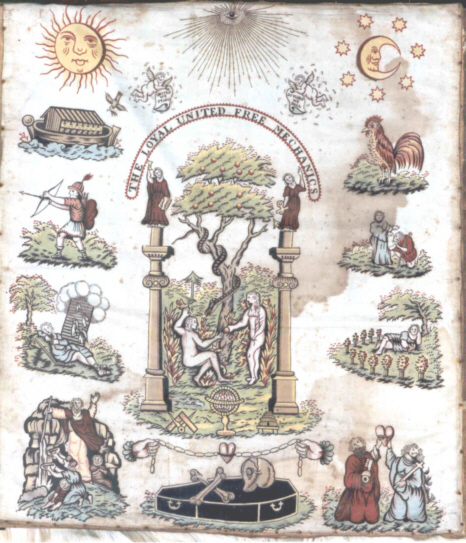 in splendour, the moon and seven stars, the
‘all seeing eye, the square and compass and the beehive are
all emblems which appeared on the membership card of the Old
Mechanics. The apron also carries the motto ‘United we stand,
divided we fall’, long the rallying cry of the trade unions.
in splendour, the moon and seven stars, the
‘all seeing eye, the square and compass and the beehive are
all emblems which appeared on the membership card of the Old
Mechanics. The apron also carries the motto ‘United we stand,
divided we fall’, long the rallying cry of the trade unions.
Much of the symbolism of the early
trade unions and friendly societies was drawn from that most
influential of secret societies, the Masons. Probably at their
founding these organisations in deciding on rules, codes of
conduct, membership certificates and general administration,
looked for existing examples which they could adapt to their own
needs. The Loyal United Free Mechanics’ rules set out the
duties of Guardians or Tylers who attended the doors of the Lodge,
just as do the Tylers in the masonic movement.
Why a semi-clandestine union should
have been in being at such a late date is not apparent, and it
may in fact have been that the Society had no objectives other
than the provision of sick and death benefits, but took the name
to honour an earlier union movement; possibly even a movement
from which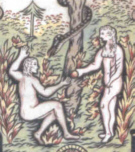 the Prince of Wales Lodge had emerged.
There are items among the rules which do not appear to have much
relevance to a friendly society. The use of passwords, and
warnings against disclosing the business of meetings to absent
members may well have been survivals from the days when the union
movement was under threat, and be an indication that the Prince
of Wales Lodge sprang from that movement. In the early days of
the union or craft movement many of the societies had stated
objectives very similar to the friendly societies, with other,
less acceptable, objectives only hinted at amongst a mass of
rules.
the Prince of Wales Lodge had emerged.
There are items among the rules which do not appear to have much
relevance to a friendly society. The use of passwords, and
warnings against disclosing the business of meetings to absent
members may well have been survivals from the days when the union
movement was under threat, and be an indication that the Prince
of Wales Lodge sprang from that movement. In the early days of
the union or craft movement many of the societies had stated
objectives very similar to the friendly societies, with other,
less acceptable, objectives only hinted at amongst a mass of
rules.
Another possibility is
that the Society came under the influence of trade union
activists who chose an evocative old name to displace the
patriotic style. It may be relevant that when in 1862 Trustees
had to be elected, the notification to the Registrar of Friendly
Societies reported that the Trustees had been elected by 37 votes
for and 20 against! Further, the three Trustees were all colliers,
none of whom were able to sign their name, and that in marked
contrast to the three members and Secretary who submitted the
notification, all of whom were able to sign.
 One possible reason for the dissention which
is indicated in the voting may have been that the Society was in
fact being taken over by coal miners. It was early recognised in
the Friendly Society movement that miners were a bad risk; by the
nature of their employment they suffered a higher rate of
sickness. When they were a small percentage of total membership
this disadvantage might be absorbed by the general membership: in
other cases the only way in which a society could ensure solvency
was to increase the rates of contributions. We have no real
knowledge of the composition of the Prince of Wales Lodge or its
successor. In the 1850s Westleigh Mills, named from its old corn
mill, was a semi-rural area, and membership could have been drawn
from agricultural labourers, workers at a sulphuric acid plant,
at cotton mills and at a colliery.
One possible reason for the dissention which
is indicated in the voting may have been that the Society was in
fact being taken over by coal miners. It was early recognised in
the Friendly Society movement that miners were a bad risk; by the
nature of their employment they suffered a higher rate of
sickness. When they were a small percentage of total membership
this disadvantage might be absorbed by the general membership: in
other cases the only way in which a society could ensure solvency
was to increase the rates of contributions. We have no real
knowledge of the composition of the Prince of Wales Lodge or its
successor. In the 1850s Westleigh Mills, named from its old corn
mill, was a semi-rural area, and membership could have been drawn
from agricultural labourers, workers at a sulphuric acid plant,
at cotton mills and at a colliery.
The rulebook of the Society gives
some interesting insights into the social conditions of the time. Any member who was "compelled
by misfortune to reside in a workhouse, or asylum, or be
imprisoned for debt" paid no contributions and was to
receive no sick benefit. Improper practices which were
specifically prohibited in the Lodge room were the reading of
newspapers or books, the singing of indecent songs, the giving of
political or sentimental toasts, the laying of wagers and the
doing of any business other than that of the lodge.
the time. Any member who was "compelled
by misfortune to reside in a workhouse, or asylum, or be
imprisoned for debt" paid no contributions and was to
receive no sick benefit. Improper practices which were
specifically prohibited in the Lodge room were the reading of
newspapers or books, the singing of indecent songs, the giving of
political or sentimental toasts, the laying of wagers and the
doing of any business other than that of the lodge.
Return to HOME.
 at the Sportsman’s Arms, Westleigh
Mill, Leigh, Lancashire. By 1862 when they registered their rules
they had adopted a new name, the Loyal United Free Mechanics. As
lodge number 85 they must have been part of some sort of
affiliated order; whether this was the case after the change of
name is not apparent. In 1872 there was in Lancashire an Order of
Mechanics which had a membership of over 3,500 in 71 lodges,
whether this was the successor to the Prince of Wales Friendly
Society, or whether the Loyal United Free Mechanics were a part
of the order is not known.
at the Sportsman’s Arms, Westleigh
Mill, Leigh, Lancashire. By 1862 when they registered their rules
they had adopted a new name, the Loyal United Free Mechanics. As
lodge number 85 they must have been part of some sort of
affiliated order; whether this was the case after the change of
name is not apparent. In 1872 there was in Lancashire an Order of
Mechanics which had a membership of over 3,500 in 71 lodges,
whether this was the successor to the Prince of Wales Friendly
Society, or whether the Loyal United Free Mechanics were a part
of the order is not known. had contributed in their earlier, healthier,
working life. Once admitted members were to pay 1s. 3d. every
four weeks plus 1d. a month to cover the necessary costs of
management. The management costs would consist principally of
rent of the meeting room, in addition it may well have included
provision of ale on meeting nights. Whilst hardly a necessity of
management, such conviviality was generally as much a feature of
such clubs as was the provision of benefits. It is significant
that the very first rule of the Society stated that the business
of the Society was to be carried on at the Sportsman’s Arms.
No mention of provision of ale or spirits could be included in
the rules or the Registrar of Friendly Societies would have
refused to register them: nor could any such outlay be shown in
the accounts of societies. To circumvent the the problem the
illicit payments were generally classed as rent! There was no
provision in the rules for any of the officers of the Society to
receive payment for their services; on the contrary there were
fines to be imposed on any who refused or neglected an office.
had contributed in their earlier, healthier,
working life. Once admitted members were to pay 1s. 3d. every
four weeks plus 1d. a month to cover the necessary costs of
management. The management costs would consist principally of
rent of the meeting room, in addition it may well have included
provision of ale on meeting nights. Whilst hardly a necessity of
management, such conviviality was generally as much a feature of
such clubs as was the provision of benefits. It is significant
that the very first rule of the Society stated that the business
of the Society was to be carried on at the Sportsman’s Arms.
No mention of provision of ale or spirits could be included in
the rules or the Registrar of Friendly Societies would have
refused to register them: nor could any such outlay be shown in
the accounts of societies. To circumvent the the problem the
illicit payments were generally classed as rent! There was no
provision in the rules for any of the officers of the Society to
receive payment for their services; on the contrary there were
fines to be imposed on any who refused or neglected an office. relative of his prior nomination; £6 for a
member’s first wife; £3 for his second wife; and £1 at the
death of a child under twelve years of age. The rules contain no
reference to a minimum age for entry: the provision of burial
benefit only up to the age of twelve would seem to indicate that
they would be eligible for entry at that age, when many would be
working. The fact that there was no provision for an entrance fee
under the age of eighteen is possibly based on an actuarial view
of the risks involved, as indeed was the graduated scale of entry
fees above that age. The level of funeral benefit was generous;
some societies allowed only £2, and in 1849 a funeral could be
conducted for as little as £2 3s. 6d.
relative of his prior nomination; £6 for a
member’s first wife; £3 for his second wife; and £1 at the
death of a child under twelve years of age. The rules contain no
reference to a minimum age for entry: the provision of burial
benefit only up to the age of twelve would seem to indicate that
they would be eligible for entry at that age, when many would be
working. The fact that there was no provision for an entrance fee
under the age of eighteen is possibly based on an actuarial view
of the risks involved, as indeed was the graduated scale of entry
fees above that age. The level of funeral benefit was generous;
some societies allowed only £2, and in 1849 a funeral could be
conducted for as little as £2 3s. 6d. Whilst on the face of it the Loyal United
Free Mechanics was a friendly society, there are indications that
it may have been something more. The adoption of the new ‘working
class’ name in place of the patriotic Prince of Wales Lodge
gives rises to questions. Whilst the title Loyal United Free
Whilst on the face of it the Loyal United
Free Mechanics was a friendly society, there are indications that
it may have been something more. The adoption of the new ‘working
class’ name in place of the patriotic Prince of Wales Lodge
gives rises to questions. Whilst the title Loyal United Free Mechanics has little meaning at the present
time, similar names had been borne by the fledgling trade unions
of the 1820s. In Bradford in 1822 when the Combination Acts which
proscribed trade unions were still in force, a Mechanics &
Friendly Union Institution was formed and at Manchester in 1826,
shortly after the repeal of those Acts, the Friendly Union of
Mechanics was founded. The latter which bore possibly the
proudest name among trade unions ‘the Old Mechanics’,
was the core around which the Amalgamted Engineering Union grew.
Mechanics has little meaning at the present
time, similar names had been borne by the fledgling trade unions
of the 1820s. In Bradford in 1822 when the Combination Acts which
proscribed trade unions were still in force, a Mechanics &
Friendly Union Institution was formed and at Manchester in 1826,
shortly after the repeal of those Acts, the Friendly Union of
Mechanics was founded. The latter which bore possibly the
proudest name among trade unions ‘the Old Mechanics’,
was the core around which the Amalgamted Engineering Union grew. in splendour, the moon and seven stars, the
‘all seeing eye, the square and compass and the beehive are
all emblems which appeared on the membership card of the Old
Mechanics. The apron also carries the motto ‘United we stand,
divided we fall’, long the rallying cry of the trade unions.
in splendour, the moon and seven stars, the
‘all seeing eye, the square and compass and the beehive are
all emblems which appeared on the membership card of the Old
Mechanics. The apron also carries the motto ‘United we stand,
divided we fall’, long the rallying cry of the trade unions. the Prince of Wales Lodge had emerged.
There are items among the rules which do not appear to have much
relevance to a friendly society. The use of passwords, and
warnings against disclosing the business of meetings to absent
members may well have been survivals from the days when the union
movement was under threat, and be an indication that the Prince
of Wales Lodge sprang from that movement. In the early days of
the union or craft movement many of the societies had stated
objectives very similar to the friendly societies, with other,
less acceptable, objectives only hinted at amongst a mass of
rules.
the Prince of Wales Lodge had emerged.
There are items among the rules which do not appear to have much
relevance to a friendly society. The use of passwords, and
warnings against disclosing the business of meetings to absent
members may well have been survivals from the days when the union
movement was under threat, and be an indication that the Prince
of Wales Lodge sprang from that movement. In the early days of
the union or craft movement many of the societies had stated
objectives very similar to the friendly societies, with other,
less acceptable, objectives only hinted at amongst a mass of
rules. One possible reason for the dissention which
is indicated in the voting may have been that the Society was in
fact being taken over by coal miners. It was early recognised in
the Friendly Society movement that miners were a bad risk; by the
nature of their employment they suffered a higher rate of
sickness. When they were a small percentage of total membership
this disadvantage might be absorbed by the general membership: in
other cases the only way in which a society could ensure solvency
was to increase the rates of contributions. We have no real
knowledge of the composition of the Prince of Wales Lodge or its
successor. In the 1850s Westleigh Mills, named from its old corn
mill, was a semi-rural area, and membership could have been drawn
from agricultural labourers, workers at a sulphuric acid plant,
at cotton mills and at a colliery.
One possible reason for the dissention which
is indicated in the voting may have been that the Society was in
fact being taken over by coal miners. It was early recognised in
the Friendly Society movement that miners were a bad risk; by the
nature of their employment they suffered a higher rate of
sickness. When they were a small percentage of total membership
this disadvantage might be absorbed by the general membership: in
other cases the only way in which a society could ensure solvency
was to increase the rates of contributions. We have no real
knowledge of the composition of the Prince of Wales Lodge or its
successor. In the 1850s Westleigh Mills, named from its old corn
mill, was a semi-rural area, and membership could have been drawn
from agricultural labourers, workers at a sulphuric acid plant,
at cotton mills and at a colliery. the time. Any member who was "compelled
by misfortune to reside in a workhouse, or asylum, or be
imprisoned for debt" paid no contributions and was to
receive no sick benefit. Improper practices which were
specifically prohibited in the Lodge room were the reading of
newspapers or books, the singing of indecent songs, the giving of
political or sentimental toasts, the laying of wagers and the
doing of any business other than that of the lodge.
the time. Any member who was "compelled
by misfortune to reside in a workhouse, or asylum, or be
imprisoned for debt" paid no contributions and was to
receive no sick benefit. Improper practices which were
specifically prohibited in the Lodge room were the reading of
newspapers or books, the singing of indecent songs, the giving of
political or sentimental toasts, the laying of wagers and the
doing of any business other than that of the lodge.